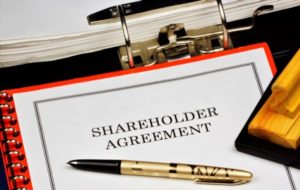Why Your Company Needs A Shareholder’s Agreement

A shareholder’s Agreement outlines how a company is to be operated, the rights and obligations afforded to the shareholders, and the relationship between the company and the shareholders. The purpose of a Shareholder’s Agreement is to ensure that both majority and minority shareholders are protected and treated fairly, and it allows shareholders make decisions on the rights and obligations to be extended to third parties who may become shareholders in the future.
Some companies may have detailed Memorandum and Articles of Association (MEMART) setting out processes relating to the transfer of shares. However, many companies are likely to have simply adopted a standard MEMART when they were incorporated and these do not look at these specific issues in any great detail. This is why Companies that have more than one shareholder would therefore be advised to put in place a Shareholder’s Agreement to provide the members, directors and the company a clear guidance as to what will happen in certain circumstances.
Although this is not a legal requirement, start-ups with more than one shareholder are often advised to make a Shareholder’s Agreement in order to further regulate the way business between them is to be conducted. The benefits of such an agreement includes:
- A well drafted Shareholder’s Agreement provides an optimum way for a company’s shareholders to resolve their conflicts. Disputes amongst shareholders can be hugely distracting and ultimately can affect the company and its viability. The agreement will provide a clear mechanism for the resolution of the disputes either through the transfer of shares or dispute resolution provisions for example in the event of a deadlock. This in turn assists with helping the company to be run smoothly and profitably.
- A Shareholder’s Agreement provides greater protection to shareholders over and above the standard company MEMART both in terms of how the company is run, the decision making process, minority shareholder and majority shareholder rights.
It provides protection for minority shareholders by reserving certain decisions, such as the ability for the company to issue further shares, which can only by made with the unanimous consent of all the shareholders.
- The content of the agreement is private between the parties i.e. it is not placed on a public register such as the corporate Affairs Commission (CAC) unlike the company’s MEMART.
- A Shareholder’s Agreement will help to regulate the management of the company. The running of the company is generally left to the board of directors. However, the shareholders may believe that there are certain decisions that should not be left to the discretion of the directors and instead require shareholder approval. Particularly if there are directors who are not shareholders.
- A Sareholder’s Agreement provides stability in the sense that most shareholders’ agreements are written in concurrence with a company’s by-laws and its MEMART. Hence, these agreements not only establish the structure and norms of the shareholders but also define the key management of the company, its board of directors and their operations. This provides an additional provision for the organisation to rely on and unlike the companies MEMART, these agreements are confidential and inaccessible to creditors or non-members. Hence, they also make sure your company’s private information stays private.
- A Shareholder’s Agreement can also provide for share transfer restrictions in the form of a buy-out agreement or a buy-sell agreement to limit the transfer of shares between key members of the organisation. If these terms are not clerly stated in the Agreement, an existing shareholder can transfer his/her shares to any member or non-member without any legal actions.
- A Shareholder’s Agreement can provide restrictions for situations where a shareholder seeks to exit the company. In this case, the remaining shareholders may wish for restrictions to apply to the exiting shareholders’ ability to set up or work in a competing business. These restrictions can be stricter than may exist in any employment contract and can be very valuable in protecting the interests of the company moving forward.
- Finally a company’s Shareholder’s Agreement can help attract investment into the business as Investors will be encouraged by the clarity that such agreements can provide.
Team 618 Bees
Sources: whittockconsulting.co.uk, corporatefinanceinstitute.com https://www.prowsechowne.com, www.ashtonslegal.co.uk
If you wish to discuss a Shareholder’s Agreement for your company, please do not hesitate to contact us, by telephoning 618 Bees on +2349017190079, or emailing hello@618bees.com
The information in this blog post (“post”) is provided for general informational purposes only, no information contained in this post should be construed as legal advice, nor is it intended to be a substitute for legal counsel on any subject matter. No reader of this post should act or refrain from acting on the basis of any information included in, or accessible through this post without seeking the appropriate legal or professional advice from the particular facts and circumstances at issue from a lawyer. This post is protected by intellectual property law and regulations. It may however be shared using appropriate sharing tools provided that our authorship is always acknowledged and this Disclaimer Notice attached
